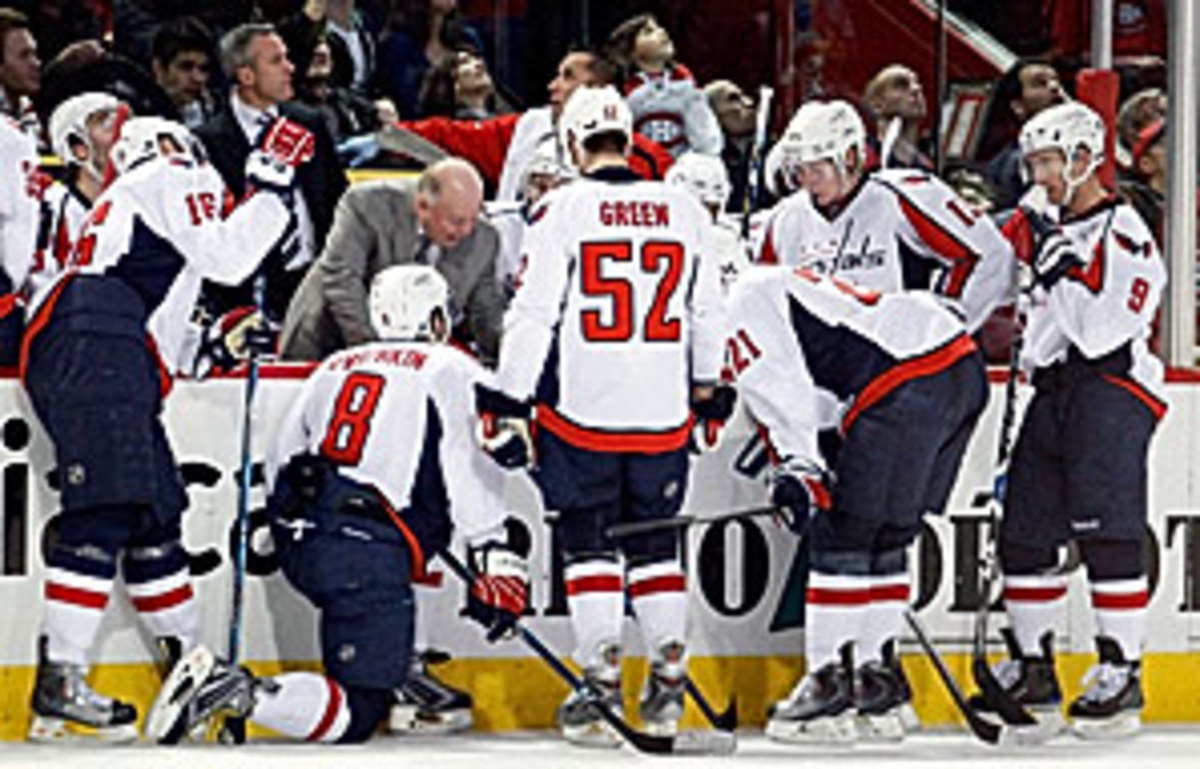
Boudreau keeps eye on Caps' down side; DiPietro's new outlook; more
For every statistic, there's a reporter searching for meaning in the numbers. In the case of the Washington Capitals, it doesn't take much to see that their red-hot streak -- 10-1-0 since Jan. 5 -- coincides with Alex Ovechkin's reign as captain and coach Bruce Boudreau's decision to stick with the same lines night in and night out, or heck, even with the trade that brought Jason Chimera in from Columbus. But trying to explain it in any of those terms is, for a coach, a fool's errand.
"There's a little bit of truth, but a lot of coincidence," Boudreau says of his team's record since he stabilized his lines. "I don't think it's as big a deal as people make it out to be. We had 108 points last year and we moved the lines around quite a lot. I can't see what Ovie's done differently [since being named captain]. And our goaltending, Theodore was playing really well. That has nothing to do with the trade. The line combinations didn't affect the goaltending."
This is one coach who is less interested in why good things are happening than how to keep them going. "It's hard to continue winning," Boudreau says. "To get the same message all the time, it's sometimes difficult. Usually teams at the end of their winning streaks aren't playing very good, and that's why losing streaks follow winning streaks."
And how does a coach keep his team from falling into that predictable pattern? "Quite frankly, we show a lot of negative clips when we're winning because there's a lot of things we can do better," Boudreau says. "You never want them to get a big head -- our guys are pretty good about that -- but it's one of those things. Sometimes success makes you think that you're a lot better than you really are."
So this morning, as the Capitals were looking to extend their streak to eight straight with the Ducks up next, Boudreau showed his players areas they could improve from Tuesday night's 7-2 demolition of the Islanders.
Indeed, he says, there's footage of their soft spots. Hard to believe, but we're willing to trust him.
Of all the things that Rick DiPietro has gained in the last two years -- reconstructed hips and knees, a gang of senior citizen friends from the rehab center where he worked out, a better cerebral understanding of the game -- nothing is more refreshing than his new perspective. The Islanders goalie, who sprang into the league in 2001 as a teenage phenom with the swagger to match, found himself staring at what could have been the end of his career.
"At 28, that's a scary thought," he says. "All the little things that you used to complain about and used to be big deals in your mind just seem ridiculous."
DiPietro evokes the names of Tom Brady and Cadillac Williams, star athletes who have returned from potentially career-ending injuries. "Like if the plane's late or if the food's wrong... who cares? It could be worse. All this little stuff you take for granted because you're so used to it, and when it's taken away, you really get a chance to have that much more respect for it.
"As a kid or in college, you think you're Superman," he continues, using the second person though it's clear he's reflecting on his former self. "You can do anything. You can't get hurt, and something like this happens. You realize that life is fragile; your career is fragile. Any day, something can be taken from you. It makes you work that much harder and appreciate it that much more. So I tell people that everything happens for a reason, and this might've happened as a wake-up call to say: Hey, you don't have much time left, you better take advantage."
DiPietro, who returned earlier this month from a one-year, six-day hiatus, has looked solid in his five appearances. His 2.54 GAA and .907 save percentage aren't quite what they were in his prime, but for someone who's been out of the game as long as he has been, it's a promising sign for an Islanders team that's just a bounce or two from playoff position.
Ah, the shootout. Since the lockout, the percentage of games that go into overtime (23%) has stayed somewhat steady. But this season -- the fifth with the love-it-or-hate-it shootout -- 63.2% that go into OT are being decided by the skills competition. That's up from 56% in 08-09 and 57% in 07-08.
Would teams rather go to the shootout than end a game in OT? New York Rangers defenseman Marc Staal told me that nobody wants to make a mistake in overtime, and maybe you play more conservatively in the extra frame. Of course, with a superb shootout goalie in Henrik Lundqvist, the Rangers likely are better off not trying to wing it in OT.
"The players want to make sure that they're not the guy who makes the mistake that causes the game to be lost," says Bruce Boudreau. "You never see the media or the papers say, 'Oh man, he really blew it. He had the game on his stick, but he blew it in the shootout.'"
Indeed, you win the game in a shootout; you lose it in overtime.
There are still plenty of games to be played, and maybe this SO number shrinks as the playoff race starts rolling. Or maybe this is a byproduct of the condensed schedule. Whatever, it's something to keep an eye on.





